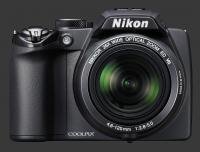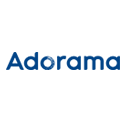Nikon Coolpix P100 Review
Nikon Coolpix P100 Usability - How easy is it to use?
The Nikon P100 is very easy to handle and operate. Its body is well built and features a deep-but-narrow hand-grip to hold it steady. The entire camera feels solid and even the hinge for the LCD screen is substantial.
The main controls are easy to use with positive click points. The shutter-release is decent with a very soft halfway point used to focus the camera before taking a picture. The P100 has a single command dial which is set on the camera's back within reach of the thumb. The dial froze several times during testing and has a cheap plasticky feel to it.
The tethered lens-cap easily stays with the camera but causes a lens-error when powered on with it in place. Underneath the P100, a metal tripod mount is placed at the camera's physical center. It is better for panoramas if the tripod mount is aligned with the lens' center but for other uses the physical center gives better balance.
The P100 is powered on by a simple button on top of the camera, behind the shutter-release. The zoom is fast with small steps. The controller is wrapped around the shutter. The top of the camera also holds the mode dial. It features the usual Auto, Program, Shutter-Priority, Aperture-Priority, Manual and Movie mode. Additionally, it has one user-mode and 5 additional positions: Auto, High-Speed Sports Continuous, Scene, Auto-Scene, Smart Portrait and Subject Tracking. The Scene mode hides all individual scene modes under one setting.

As most ultra-zooms, this camera features a large rear LCD and a small EVF. The EVF it is quite small, making judging details and focus very difficult. Despite the LCD having twice the resolution and being plenty sharp with good visibility, the coverage is quite poor. Under normal use, it has 94% coverage which is below the standard 100% coverage norm for fixed-lens digital cameras. In Backlit HDR mode, the viewfinder shows approximately 108% coverage instead. This makes accurate framing impossible as part of what is shown in the LCD is cut off when the image is captured.
The LCD preview is unfortunately rarely accurate. While white-balance does not seem to be much of a problem, exposure is. Sometimes the LCD shows an image of the wrong brightness before the shutter is pressed and sometimes it shows a wrong one after. EC changes the preview but not by the correct amount. Therefore you do not know when images will be incorrectly exposed.

The camera has a button to switch between the EVF and LCD which is separate from the display mode button. The display mode button cycles through the image-only, information and alignment grip modes.
On the camera's rear, a standard 4-way controller is used to navigate menus and as short-cut to some camera functions. Those functions are: flash-mode, self-timer, exposure-compensation and focus mode. Unfortunately, ISO, white-balance and drive mode do not have dedicated buttons and therefore must be changed by using the menu system. The menus are easy to navigate. This camera is shooting-priority, so a halfway press of the shutter returns this Coolpix to the set shooting mode. There is a playback button which toggles playback mode. The user interface has plenty of useful and intuitive indicators to remind users of how to operate the camera. There is also a delete button which prompts for deletion of the last image shot when in shooting mode. In playback mode, the delete button prompts for deletion of the displayed image.
ISO is selectable between 160 and 3200. Because the usable ISO range depends on the medium, it is very nice when a camera like the P100 allows the Auto ISO range to be selected. The Nikon P100 offers 4 possible ranges: 160-200, 160-400, 64-800 (called Auto) and 160-1600 (called High ISO sensitivity auto).
This ultra-zoom allows for -2 to +2 stops of exposure compensation and flash compensation, both in 1/3 stop increments. Exposure bracketing can be set in increments of 1/3, 2/3 or 1 EVs and always captures 3 frames. This camera allows to reset file numbering via the Setup menu, file-numbers keep increasing, even after formatting a card, otherwise.
 |
Please Support Neocamera
All information on Neocamera is provided free of charge yet running this website is a huge endeavor. Purchases made via affiliate links found throughout the site help keep it running and up-to-date. There is no additional cost to you, so please consider buying via these links to our affilates:
If you found any information on this site valuable and did not purchase via our affiliate links, please considering donating via PayPal:
Any amount will be greatly appreaciated. Thank you for your support!
Nikon P100 Highlights

Sensor-Size: 6 x 5mm

Actual size when viewed at 100 DPI
| 10 Megapixels Ultra Zoom | ISO 160-3200 |
| 26.1X Wide Optical Zoom | Shutter 1/2000-8s |
| Built-in Stabilization | Full manual controls |
| 0.24" Built-in EVF 230K Pixels | Custom white-balance |
| 10 FPS Drive, 6 Images | Spot-Metering |
| 1920x1080 @ 30 FPS Video Recording | Lithium-Ion Battery |
| 3" LCD 460K Pixels | Secure Digital High Capacity |
Updates
2025.01.18

Fujifilm GFX 2025 Lens Roundup
Lens Review roundup of Fujifilm GFX Medium-Format lenses. Quality, performance and handling of the GF20-35mm F/4R WR, GF30mm F/3.5 Tilt-Shift and the GF55mm F/1.7.
2024.11.18

Best 2024 Photography Gifts for Every Budget
Great gifts for photographers and photo enthusiasts selected for every budget among the best products of 2024.
2024.08.07

Eye Protection Tips for Professional Photographers
The four main considerations for professional photographers regarding eyewear.
2024.07.14

Fujifilm X100VI Review
Flagship fixed-lens compact digital camera with a 40 MP sensor and Image-Stabilization, a first for the series. Retro design featuring dual control-dials, plus direct ISO, Shutter-Speed and EC dials. Its hybrid viewfinder can switch between EVF and OVF mode.
2024.05.09

Fujifilm GFX100 II Review
Flagship 102 Megapixels Medium-Format Mirrorless Digital Camera with 8-Stop 5-Axis IBIS, 8 FPS Drive, 8K Video and 400 MP Super-Resolution capture in a weatherproof and freezeproof body with dual control-dials and dual memory-card slots.
2024.04.03

Fujifilm X-T5 Review
Newest Fujifilm flagship boasting a 40 MP APS-C sensor, 5-axis IBIS with 7-stop efficiency, 15 FPS continuous drive, 6.2K Video capture, dual control-dials and dual SDXC UHS-II slots in a sturdy weatherproof and freezeproof body.
2023.11.20

Best Digital Cameras of 2023
Find out which are the Best Digital Cameras of 2023. All the new Mirrorless Digital Cameras from entry-level to high-end professional.
2023.07.10

Fujifilm X-H2 Review
40 Megapixels APS-C Hybrid Mirrorless Digital Camera with 7-stop IBIS. Fastest shutter ever and 8K video capture. Large builtin EVF with 0.8X magnification and 5.8 MP, plus an Eye-Start Sensor. Packed with features and large number of controls in a weatherproof and freezeproof body.
2023.05.07

Sony FE 20-70mm F/4G Review
Review of the unique Sony FE 20-70mm F/4G lens. The optical zoom of this lens spans ultra-wide-angle and medium focal-length coverage, making it one of the most versatile Full-Frame lenses on the market.
2023.01.15

Huion Inspiroy Dial 2 Review
Review of the Huion Inspiroy Dial 2 tablet, a medium sized drawing surface with dual dials and customizable buttons. Connects via USB-C or Bluetooth 5.0 with Windows, Linux and Android support.
2022.12.08

How to Pack for a Photo Trip
Find out how to pack for a travel photography trip, carry your gear safely while meeting airline regulations.
2022.11.13

Best Digital Cameras of 2022
The best digital cameras of 2022. A short list of the most outstanding models in their respective categories. Choose one for yourself or as a gift.











